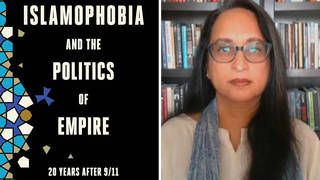
Guests
- Nazia Kaziprofessor of anthropology at Stockton University. Her latest article for The Chronicle of Higher Education is “Teaching Against Islamophobia in the Age of Terror.”
In the aftermath of several terrorist attacks over the weekend that involve Muslim suspects, we speak with professor Nazia Kazi of Stockton University about her latest article for The Chronicle of Higher Education, “Teaching Against Islamophobia in the Age of Terror.” “The U.S. war on terror would not have been possible without a deep, public anti-intellectualism,” Kazi argues. “Many of my students have been fed these binaries about the free world and the unfree world, peace-loving people and terrorists.”
Transcript
AMY GOODMAN: I wanted to bring in Nazia Kazi, our fourth roundtable guest, professor of anthropology at Stockton University. Her latest article for The Chronicle of Higher Education, “Teaching Against Islamophobia in the Age of Terror.” And as we have this discussion and all that took place this weekend in our neighborhood here in New York City in Chelsea, two bombs being placed here—one went off, 29 people injured. Then, in New Jersey, I think it was a backpack of some pipe bombs found outside an Elizabeth, New Jersey, train station. Actually, it was homeless men who found the backpack and told the police what they saw inside—wires and pipes. And also what happened in an area of New Jersey where there was going to be a race for Marine families, and the bomb went off in a trashcan, and it was only because the race was late that nobody got hurt. But, Nazia Kazi, your response?
NAZIA KAZI: Yeah, so, as an educator and someone who spends a lot of time in the university classroom, I get to see firsthand the ways in which a lot of our young people understand terror. You know, most of them have grown up in the so-called terror age, post-9/11. And the bad guys, to put it so simply, have been Osama bin Laden, ISIS, Saddam Hussein and al-Qaeda. And there is very little nuance, quite often, in their understanding of these global realities.
One of the things I find in the university classroom, and I talk about it in this piece, is the really puzzling coexistence of a deep hawkishness and a systemic ignorance. So, on the one hand, students will have very strong opinions about what the U.S. needs to do globally, but actually have very little knowledge about the histories of, say, Muslim-majority countries. And I take very seriously the fact that these things coexist. I think that the war against terrorism, the U.S. war on terror, would not have been possible without a deep, public anti-intellectualism. In other words, there’s kind of a systemic ignorance that the war on terror needs, it requires, in order to operate. Many of my students have been fed these binaries about the free world and the unfree world, you know, peace-loving people and terrorists, and have accepted these binaries wholesale. And the job for us as educators is to really—what I argue, is to insert critical thinking as a terrorism prevention tool, you know, a way of thinking past these simplistic binaries, and thinking geopolitically, historically and contextually, making connections between U.S. racism domestically and imperialism abroad.
AMY GOODMAN: We’re going to break and then come back to this discussion. Professor Nazia Kazi teaches anthropology at Stockton University. She’s speaking to us from Philadelphia. Dr. Debbie Almontaser is head of the Muslim Community Network. She’s the founding principal of the Khalil Gibran International [Academy]. Haji Yusuf is with us in Minnesota. He’s with #unitecloud in St. Cloud, Minnesota. And Ramzi Kassem is a CUNY School of Law professor. Stay with us.












Media Options